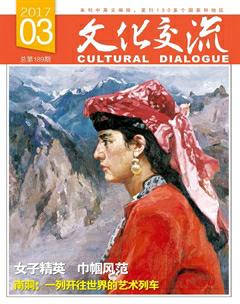南洞:一列开往世界的艺术列车
季长弓
“功勋号”火车是南洞艺谷的标志性景点。经过改造,车厢内依次设立了特色音乐火车餐厅、火车影院、“火车青旅”、小点音乐艺术台直播间等别具一格的设施。这列长长的绿皮火车仿佛是一列开往世界的艺术列车。
“这里是一个天然大氧吧,是‘美丽经济,印证了绿水青山就是金山银山的重要理论。下次来了,咱就住这里!”2015年5月25日,习近平总书记在舟山市定海区新建社区考察调研时,对南洞艺谷作了高度评价。总书记的赞誉,让南洞艺谷美名远扬。
2016年10月26日,30余位来自海内外的媒体记者走进坐落在舟山定海的干镇新建社区即南洞艺谷。南洞艺谷占地面积达2平方公里,这里拥有美好的自然生态环境、浓郁的文化艺术气息。经过近6年的打造,如今,它就像一颗撒落在东海洋面熠熠闪光的明珠。
充满诗情画意的美术乐园
南洞艺谷家家户户的外墙,是一幅幅彩绘壁画,色彩斑斓,形象生动。这些壁画色彩风格各不相同,有古色古香的传统中国画“嫦娥奔月”,也有满是英文的美式涂鸦;有充满中国古典特色的戏剧脸谱,也有生动活泼的卡通形象……充满创意的壁画使这些村舍顿时灵动起来。
穿行在南洞的民居小巷,就像走进了一片艺术长廊。复古修建的明清老街同是徽派风格,古朴的廊桥、静谧的宅院,与青山绿水浑然天成。
来到南洞艺谷,“群岛美术馆”是不得不去的地方,这是舟山市首个村级海岛美术馆。
群岛美术馆馆长张高俊介绍,美术馆建筑面积500平方米左右,拥有书画院、展示厅和会议室等,免费向公众开放。舟山渔民画是从上个世纪80年代发展起来的中国现代民间绘画之一。作者绝大部分是渔家儿女,作品反映的也都是渔民日常劳动、生活场景和海洋渔区所特有的海边风俗、民间传说等,注重地域特色。
这些个性强烈的艺术作品因具有原汁原味的大海情感、无拘无束的变化手法、无法意料的形式美感,透露出一种特殊的表现力和吸引力。
走进美术馆,柔光映照着大量的美术作品,海洋浮雕、舟山漆盘、船木家具、渔民画等等,令人目不暇接。扎蟹、晒鱼鲞、补渔网、看大戏……一幅幅带有“海味”的渔民画映入眼帘。
张高俊是舟山渔民画产业协会会长,已经为当地村民陆续办了7期培训班,数十人跟着他学会了版画、剪纸等手艺,年龄最大的已经有70多岁。
群众艺术创作中心展览着近百件由当地村民创作的工艺美术作品。看了一件件充满生活气息的画作和手工艺品,习近平总书记连声称赞正在绘画的村民和艺校学生心灵手巧,称赞指导老师做了一件有意义的事。他说,舟山渔民画很有特色,很有味道。这里氛围很好,为家乡培养了人才。
习总书记调研新建社区时,正值浙江职业艺术学院学生在此写生,他们高兴地将自己的画作赠送给总书记。
底蕴深厚的舟山海洋文化孕育着优秀的本土艺术,充满生机与活力的海岛为渔民画作者提供了广阔的创作舞台。
南洞戏剧谷春色如许
如今,“南洞艺谷”又添一个响亮的名号——“中国南洞·戏剧谷”。
听闻村里要办“戏剧谷”,78岁的袁阿婆很是高兴,“有戏文看,老百姓当然开心!”而“戏剧谷”的打造,又何止“戏文”?戏剧舞台改造、戏剧广场建设、戏剧景观街打造,这些全新的项目已经提上日程,将在今年年底前全部建成。南洞还将引进知名戏剧文艺团队、戏剧名家工作室,组织戏剧演出,建设中国戏剧原创实验基地。目前,已组建了三支戏剧团队,开展文化传承、戏剧培训、演出等活动。
2011年,幽兰吐蕊,全国戏剧名家聚会南洞献智献策,“南洞戏剧谷”风生水起。
新建社区在新农村建设中打破传统思维和模式,规划全国艺术院校大学生实习采风基地,他们改造部队旧营房,配套建设了一次性可容纳600人居住的学生宿舍。2011年4月9日,南洞的全国艺术院校大学生实习采风基地与中国美院、浙江艺术职业学院、华侨大学等26所院校建立紧密合作关系。如今,“中国南洞·戏剧谷”年均接待艺校学生达到3万余人次。
在定海南洞艺谷的水库大坝上,经常能看见一群漂亮的女孩在绿水青山的环抱中,开嗓练声、训练形体。“南洞真的很美,在这里排练,嗓子放得开,经老师指导一点就通。”一名叫陈杉杉的学生说,她们来自浙江艺术职业学院戏剧系,来这里主要是排练毕业作品——越剧《五女拜寿》。
2016年5月23日,新建社区重要的文化地标——文化礼堂建成开放,一楼就是戏剧展陈馆,陈列着色彩鲜亮、形态各异的戏剧脸谱和古色古香的二胡、小鼓、的笃板等乐器……通过精美戏服、演出道具等陈列展示,弘扬中国传统戏剧文化。
一位来自法国华文报的记者说:“这里是一个戏剧的艺谷,也是舟山地方戏曲的展示基地。”她指着展厅中舟山木偶戏的图照饶有兴味地说道。
舟山的布袋木偶戏,传说是从宁波传入,吸收本地的土语、民间小调、地方戏曲等成分,逐渐形成独有的海岛风格,2009年被列入第三批省级非物质文化遗产保护名录。
“中国南洞·戏剧谷”,在新建生态村多彩的文化画卷添上浓墨重彩的一笔。
当阿拉伯艺术家邂逅藝谷的海洋文化
除了戏剧,还有音乐、摄影、刺绣、太极功夫,多种艺术门类在这里相辅相成,相映生辉。
小点音乐工场犹如高山流水,琴瑟合鸣。该音乐工场由王飞跃创办,是集词曲创作、音乐制作、企业歌曲定制、音乐艺术培训、专业录音棚录音、演艺音乐活动策划于一体的专业音乐机构。
走进刘彩素手工艺工作室,只见飞针走线,巧夺天工。她的绒线绣,又叫绒绣、毛线绣,是用彩色毛线在特制的网眼麻布上进行绣制的手工艺品。绒线绣起源于法国,18世纪开始流行于欧洲,并为欧洲王室所推崇。
刘彩素今年60岁,是干镇青龙社区村民,爱好看书、种花,年轻时就是远近闻名的绣花能手,现在负责姐妹绣花加工厂。这个绣花厂名声在外。刘彩素在绣花、钉珠等手工艺制作方面技术精湛,还主持幼儿刺绣教学和成人绒绣制作工艺培训。在浙江省妇女手工艺产品创意大赛中,由该镇妇联选送的绒绣作品《春华秋实》获得三等奖。该作品做工精细,是纯羊毛线手工绣制,采用传统的绒绣针法,经过十余天绣成。作品正中是一朵国色天香的牡丹,花开正艳,春意盎然,表达了作者对美好生活的向往和赞誉。
當阿拉伯艺术家遇见舟山海洋文化,会擦出怎样的火花?
参加第五届“意会中国”访华采风暨海上丝绸之路舟山行活动的阿拉伯知名艺术家们,来到定海南洞艺谷。这儿无处不在的浓郁海洋文化艺术气息、有着民间画图案的枕套杯垫和挂饰、绘有观音佛像的丝巾,甚至用旧船板制成的桌椅,都让阿拉伯艺术家爱不释手。
工作室铺着的一幅创作中的漆画作品,成了阿拉伯艺术家们围观的对象。也门艺术家马兹哈对漆画的创作工艺和原料非常感兴趣,他摸摸画板上粘着的贝壳片,还用手指捻了点漆屑闻一闻。漆画是张高俊的绝技,他有两幅作品入选了第十二届全国美展。
张高俊捧出一摞《高俊画集》,赠送给11位来访的阿拉伯艺术家,68岁的摩洛哥艺术家萨义德也拿出一本个人四十年创作的画集作为回赠。张高俊眼前一亮,“画得真不错,手法特异,风格空灵,值得我们借鉴。”苏丹艺术家约瑟夫邀请张高俊去苏丹采风创作一个月。“如果时机合适,当然去。他们是‘海上丝路舟山行,我来一趟‘海上丝路阿拉伯行嘛!”
在舟山本土画家张高俊爽朗而自豪的笑声中,人们感悟到各国艺术家之间一旦产生共鸣,便可以跨越种族与语言交流的屏障而融合在一起。
“绿水逶迤去,青山相向开。”南洞艺谷之美,如同一轴流淌着的山水画卷。习近平总书记到访南洞艺谷,令世界关注。南洞艺谷正在打造一张国际金名片。
春暖花开时节,全国各地的游客、艺术家乃至国际友人、嘉宾纷纷来到舟山定海南洞艺谷参观访问,进行文化交流。他们第一眼看到的就是那列绿皮火车。南洞艺谷这列不同寻常的文艺列车将开出国门,开向世界的远方!
Island Village Prospers
in Art
By Ji Changgong
Nandong used to be a quiet village on Dinghai, the biggest Island in Zhoushan Archipelago, Zhejiang Province. About six years ago, it began to recreate and redefine itself in art. The effort and ambition have paid off. On May 25, 2015 President Xi Jinping came to visit the village during his inspection tour on the archipelago and admired and praised the scenic beauty of the island village. President Xis appreciation put the village on the map. Tourists and journalists have come in to take a look at the village that is thriving in art.
Nowadays, the village has renamed itself as Nandong Art Valley. The houses displays wall paintings in bright colors and most of these images on the walls can be seen, completely and incompletely, from afar. The murals come in a collage of different styles. Some are traditional images in traditional and folk art styles. Some are graffiti images with English messages. Some are cartoon personalities. Talking a stroll through the village of traditional houses and covered bridges gives one a brief lecture on the architectural styles of the dynasties of the Ming (1368-1644) and the Qing (1644-1911) that have survived on the island.
Archipelago Art Museum is a must for tourists. The 500-square-meter structure gives visitors an insight into the local folk art, known as fishermens painting, which germinated in the 1980s and has bloomed in the archipelago since then. The nearly 100 paintings on display inside the museum are very different from the wall paintings outside. All the paintings are created by villagers, reflecting the island lifestyle, everyday activities, customs, faith, folklore and legends. Unexpected, unbridled, and unpretentious, these artworks create a raw appeal in garish colors and raw brushwork.
The artworks are by villagers. Zhang Gaojun, director of fishermen painters association of Zhoushan and curator of Archipelago Art Museum, has held seven training courses in Nandong and dozens of villagers have come in to learn printmaking and paper-cutting. The oldest student is in his 70s.
The art village also attracts art students from outside the archipelago to sketch and prepare their graduation work there. President Xi Jinping on his 2015 visit to Nandong ran into a group of students from Zhejiang Vocational Art Academy sketching there.
Students favor the village for another reason. A nearby military barracks has been remodeled into a huge compound which can accommodate 600 students. In 2011, Nandong struck up strategic partnerships with 26 higher education institutions such as China Academy of Art, Zhejiang Vocational Art Academy, and Overseas Chinese University across the country. Nowadays the village receives 30,000 students a year. As some art schools in China also have theater departments, art students visiting Nandong also include those studying performing arts. With the constant presence of young artists in the village, Nandong has turned itself into a theater sanctuary. In May 2016, the village unveiled a new cultural center, which doubles as a theater museum. On display are facial masks, traditional music instruments used in regional operas, and costumes in various designs and colors. Also on display are hand puppets. The local puppet show originally came from Ningbo, a port city on the mainland across the sea. After the puppet show came to the archipelago, the art absorbed expressions from the dialect, folk tunes on the islands, and island theater performances. Over centuries, the puppet show has grown into its own and features a distinct island style. In 2009, the provincial government put the show on an intangible cultural heritage list for cultural preservation.
Nandong doesnt define art in a narrow sense. Music, photography, embroidery and Chinese shadow boxing have taken their respective footholds there. Xiaodian Music Studio, operated by Wang Yuefei, has a complete professional-class recording system and has space for music and art training. Liu Caisu, an archipelago islander, runs an embroidery workshop in Nandong. The 60-year-old folk art master was a local celebrity of embroidery in her youth years. Now she owns and operates an embroidery plant and hosts a training course. Her embroidery work once won a third award at a provincial competition for women artists.
In addition to the artistic ambiance of the island village, there is a long train parked outside the village. The island itself doesnt have a history of railroad and the train doesnt move and isnt going anywhere. It is just a landmark suggesting the outside world. The train has a long history of honors and now retired to the village on the island. The train cars now respectively serve as a restaurant, a movie house, a hotel, a music radio.

